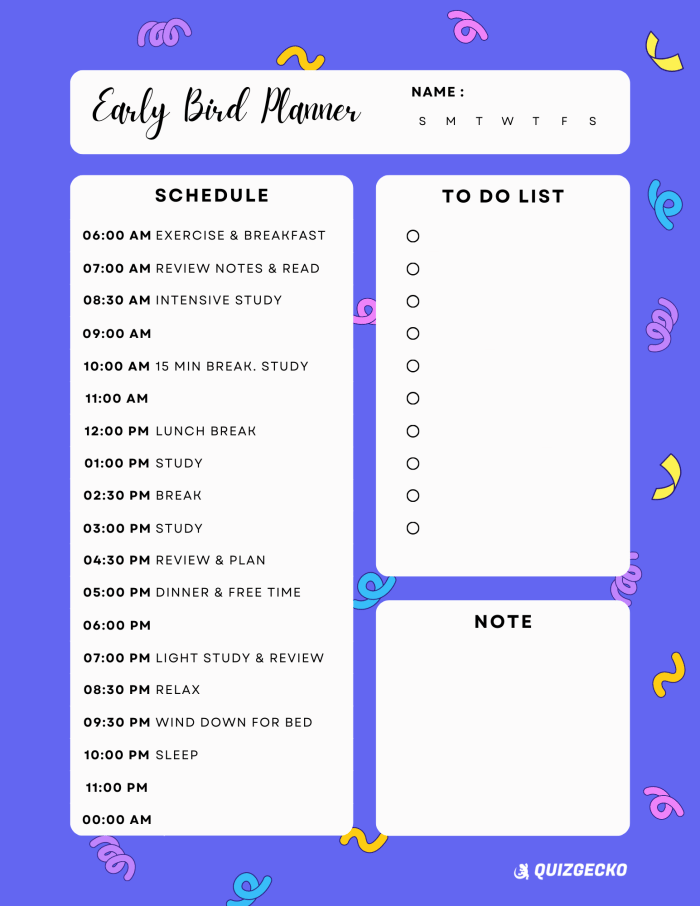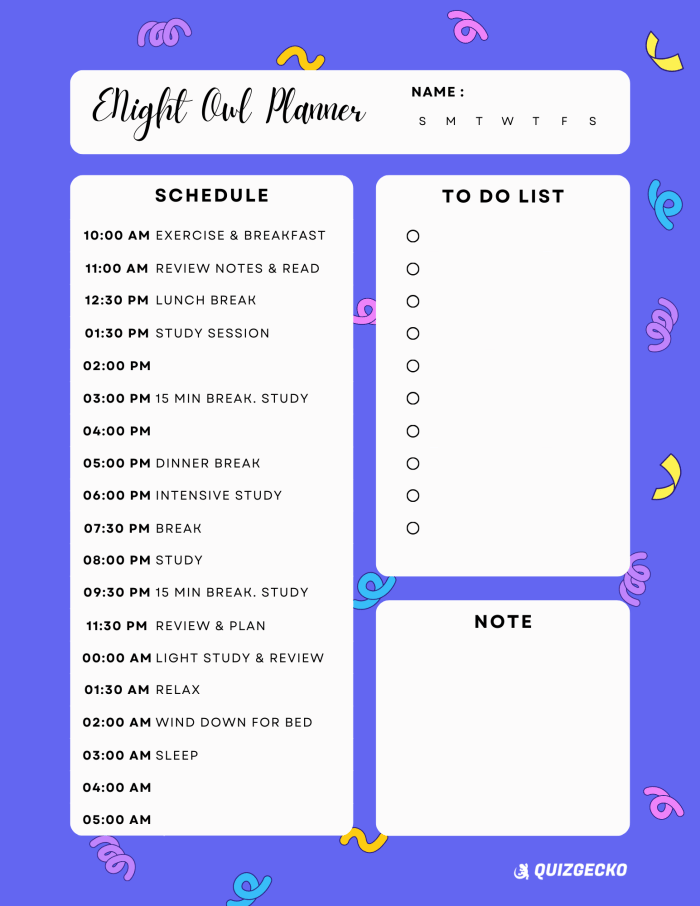Boost Your Study Game: Harness Energy Cycles for Optimal Learning
Unlock your study potential by aligning with natural energy cycles. Learn how to optimize focus, boost retention, and ace exams using science-backed techniques.

Have you ever wondered how some of your classmates aced their exams with nights of cramming while others boast about the power of early morning study bouts? Two people may be students together, studying the same course and attending the same classes, yet have two entirely different internal clocks. Here’s what we mean.
Some people are naturally wired as early birds and just find their eyes wide open at dawn. Others, not so much. They are night owls who find that the quietness at night helps them remain alert and attentive. Understanding your sleep-wake cycle or chronotype and aligning your study routine accordingly can make all the difference in studying effectively. It can greatly improve your focus and information retention.
The science behind the early bird vs night owl dichotomy lies in the action of the hypothalamus in the brain. This part of the human brain is responsible for regulating our circadian rhythm. This circadian rhythm is what translates to our sleep-wake cycle. The circadian rhythm is determined by light exposure, hormones like melatonin, and our overall genetic makeup. The circadian rhythm for early birds is tilted toward earlier sleep and wake times, and that of night owls towards later sleep and wake times.
Identifying your chronotype is the first step to knowing the best times to study. Do you consider yourself someone who wakes up early, energized and ready to take on the day? Or have you observed yourself to only be able to get up and going as the sun sets? If you are unsure, a few online materials can help you pinpoint your sleep-wake preferences. The morningness-eveningness questionnaire is one such resource for self-assessment.
Some readily available apps can also help you track your sleep cycle to identify your natural tendencies. Understanding your chronotype allows you to design a study schedule that aligns with your peak energy levels and cognitive function.
There are advantages to being an early riser. Prompt risers frequently report feeling more focused and aware during the peaceful moments before dawn. A study on early risers showed that they are generally more proactive than evening people. So, if you notice that you are able to easily master difficult material, or take on complicated concepts with focus and fewer outside distractions in the morning. Good news! You are an early bird.
As such, organize your day so that your most tasking study assignments occur within your window of greatest performance, that is in the morning, to get the most out of your early start. To wake up feeling rejuvenated and prepared to study, schedule your meals and ensure you receive the recommended 7-8 hours of sleep each night. In maintaining your internal clock, consistency is essential. Try to go to bed and wake up around the same time every day, especially on weekends.
6:00 AM - 7:00 AM: Wake up, light exercise, and breakfast
7:00 AM - 8:30 AM: Review notes and reading
8:30 AM - 10:00 AM: Intensive study session (focus on difficult topics)
10:00 AM - 10:15 AM: Break (take a walk or stretch)
10:15 AM - 12:00 PM: Study session (practice problems or writing assignments)
12:00 PM - 1:00 PM: Lunch break
1:00 PM - 2:30 PM: Study session (review and consolidate morning's work)
2:30 PM - 3:00 PM: Break (light snack, short nap if needed)
3:00 PM - 4:30 PM: Study session (group study or collaborative projects)
4:30 PM - 5:00 PM: Review and plan for the next day
5:00 PM - 7:00 PM: Dinner and free time
7:00 PM - 8:30 PM: Light study session (reviewing notes or easy reading)
8:30 PM - 9:30 PM: Relaxation (reading for pleasure, light exercise)
9:30 PM - 10:00 PM: Wind down for bed

Research shows that University students tend to perform best cognitively later in the day from around 11am or noon, rather than in the early morning hours when classes typically begin. Suffice it to say many students are night owls. However, it is sad that some Universities don’t have their academic schedule adjusted to cater to this demographic of people. The study suggests that university schedules are temporally mismatched with the circadian rhythms of many students, which can contribute to poor sleep, health issues, and impaired academic performance when students must try to learn at sub-optimal times of day for their biology.
Regardless, being a night owl has its advantages. The quietness of the night can help ease the comprehension of tough concepts because of a lack of distraction and environmental noise. Hence fostering deep concentration and enhancing creativity. Night Owls enjoy the lack of pressure that comes with the night, where they can delve into topics without being rushed.
If you're a night owl, optimize your study schedule to take advantage of your burst of energy in the evening. Plan your most intense study sessions for later in the day to give yourself time to relax and awaken before delving into the literature. Still, consistency is essential. It is important to establish a consistent sleep pattern, even if it means staying up later than the early risers.
10:00 AM - 11:00 AM: Wake up, light exercise, and breakfast
11:00 AM - 12:30 PM: Light study session (reviewing notes or easy reading)
12:30 PM - 1:30 PM: Lunch break
1:30 PM - 3:00 PM: Study session (group study or collaborative projects)
3:00 PM - 3:15 PM: Break (take a walk or stretch)
3:15 PM - 5:00 PM: Study session (practice problems or writing assignments)
5:00 PM - 6:00 PM: Dinner break
6:00 PM - 7:30 PM: Intensive study session (focus on difficult topics)
7:30 PM - 8:00 PM: Break (light snack, short nap if needed)
8:00 PM - 9:30 PM: Study session (review and consolidate evening's work)
9:30 PM - 9:45 PM: Break (take a walk or stretch)
9:45 PM - 11:30 PM: Intensive study session (focus on challenging concepts)
11:30 PM - 12:00 AM: Review and plan for the next day
12:00 AM - 1:30 AM: Light study session (reviewing notes or easy reading)
1:30 AM - 2:00 AM: Relaxation (reading for pleasure, light exercise)
2:00 AM - 2:30 AM: Wind down for bed

Finding your times of greatest cognitive performance is crucial, regardless of your chronotype. You are most awake, concentrated, and prepared to take in information at this time of day. Experiment and find out when you're most alert and energetic by nature. Plan your hardest study assignments to fall within these study windows, leaving you with less tasking jobs when your concentration could waver, like reviewing your notes or doing practice problems.
Remember to include deliberate breaks in your study plan. Because our brains work best in short bursts, take a quick break every 30 to 60 minutes to get up, walk about, and clear your head. Long periods of uninterrupted study time might cause weariness and a loss of concentration.
In some cases, you may unexpectedly have to change your study schedule. A number of important things can warrant this change: A morning class or a late night shift. Whatever the reason, it is important to be flexible and devoted to finding out what works best for you in the long term. If you're a sunrise person who sometimes has to stay up late, try to make up for it by getting more sleep in the following days. Those who are night owls yet have an early morning obligation might gradually change their sleep routine by starting a week or two earlier each day and retiring to bed.
Remember to maintain consistency, as it is the key to getting the best out of the study schedule that you ultimately choose and the stabilization of your circadian rhythm. Listen to the hints your body gives you and be willing to adapt your study routine to get your best productivity. If you have to pull an all-nighter, prioritize sleep the following day.
No study schedule is impeccable, but when you understand your body’s natural sleep-wake cycle, you can harness your peak moments during the day to achieve your best academic performance. Follow your inner nocturnal or daytime demeanor, give special attention to your body's needs, and don't be scared to try new things. A rested and attentive mind is an invaluable asset for academic achievement.
Unlock your study potential by aligning with natural energy cycles. Learn how to optimize focus, boost retention, and ace exams using science-backed techniques.
Discover the Leitner system: a powerful flashcard technique using spaced repetition to boost memory. Learn how to optimize study and improve retention.
Boost your learning with the retrieval practice study method. Discover how active recall enhances memory retention & outperforms traditional study techniques.
Explore the Quizgecko platform and create your first online quiz, test or assessment. No credit card required.